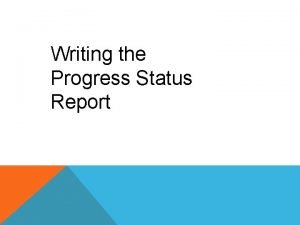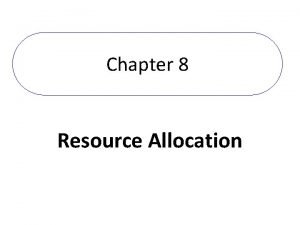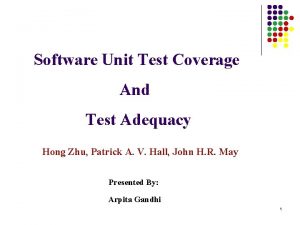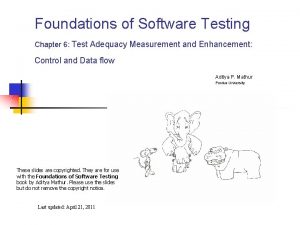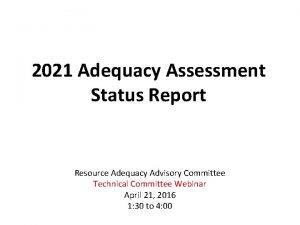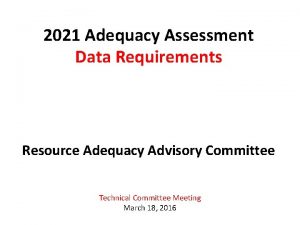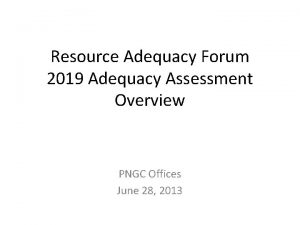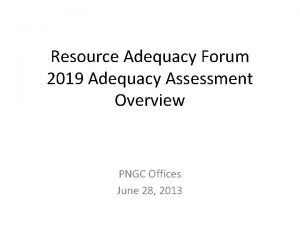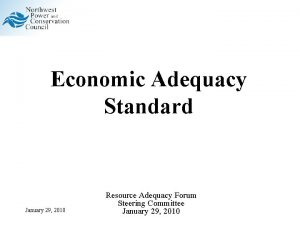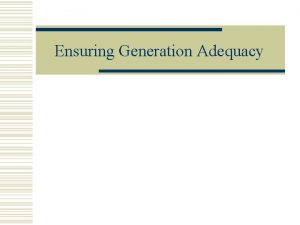2021 Adequacy Assessment Status Report Resource Adequacy Advisory








- Slides: 8

2021 Adequacy Assessment Status Report Resource Adequacy Advisory Committee Technical Committee Webinar April 21, 2016 1: 30 to 4: 00

Agenda • Review of reference case and other scenarios • Preliminary results (if available) • Detailed discussion of load forecasts • Brief description of Long and Short-term Models • Comparison of LTM and STM loads • Adding hourly load shapes and EE savings to the LTM (load stretching program) • Description of load stretching program, if time and interest allow 2

2021 Reference Case (see next slide for more detail) • Loads (from 7 th power plan) • • Long-term model frozen-efficiency medium loads EE quarterly mean and peak targets from 7 th plan Hourly loads derived from short-term model (load stretching) Existing DR (? ) • Import availability • Spot (available all hours, winter only) • Purchase Ahead (available light-load hours, all year) • IPP generation • Full availability (2, 943 MW) winter • Limited availability (1, 000 MW) summer • Wind 4, 845 MW nameplate (modeled as BPA wind) (? ) • Solar 248 MW nameplate, fixed generation pattern (? ) 3

Reference Case Assumptions Item Quarter 4 Quarter 1 Quarter 2 Quarter 3 Mean Load 1 (a. MW) 22, 059 22, 263 19, 962 20, 837 Peak Load 1 (MW) 31, 191 31, 733 25, 022 26, 448 DSI Load (a. MW) 338 338 Mean EE (a. MW) 1, 545 1, 574 1, 208 Peak EE (MW) 2, 660 1, 680 Existing DR (MW) (? ) 607 1, 047 Spot Imports (MW) 2, 500 0 0 Purchase Ahead (MW) 3, 000 1 No EE or DSI 4

Suggested Scenarios • Reference Studies (for heat map) • • Reference Case (see previous slides) Load Ranges (medium and high) (? ) Import Ranges (1700, 2500, 3400 MW) (? ) Sensitivity Studies • • Reference Case using STM loads Fuel Limitation Case • • • Reduce IPP winter capacity by about 20% (roughly 600 MW) (? ) Potential future enhancement – IPP winter capacity as a function of temperature Demand Response Sensitivity • • • No DR Minimum DR (existing DR + 600 MW from RPM) Expected DR (existing DR + 1, 300 MW from RPM) 5

Not Modeled for 2021 • Import uncertainty • Forced outage rate for intertie • “Forced outage” rate for imports • Market friction • Mostly focused on within region exchanges • Because of nodal structure in GENESYS cannot do explicitly • Can vary in-region market as function of temperature as a surrogate approach • Model economic load uncertainty explicitly • Instead of high and low load scenarios • Built in as a random variable 6

2021 Preliminary Results NOT FOR GENERAL DISTRIBUTION Study No DR Exist DR Min DR Expected DR 7 th Plan Med LTM (no EE) 16 12 9 7 7 th Plan Low LTM (no EE) 6 4 3 2 7 th Plan High LTM (no EE) 37 28 21 16 7

2021 Preliminary Results NOT FOR GENERAL DISTRIBUTION Study No DR Exist DR Min DR Exp’d DR 7 th Plan Med LTM (no EE) 16 12 9 7 7 th Plan Low LTM (no EE) 6 4 3 2 7 th Plan High LTM (no EE) 37 28 21 16 Med STM (implicit EE) 11. 3 10. 2 9. 4 8. 1 Med LTM Hybrid Mo EE 12. 5 8. 8 6. 4 4. 6 • Preferred method is LTM Hybrid approach using monthly shaped EE targets. • In the med load scenario, the region needs all 1, 400 a. MW of EE and 1, 300 MW of demand response to get below 5% LOLP. 8

